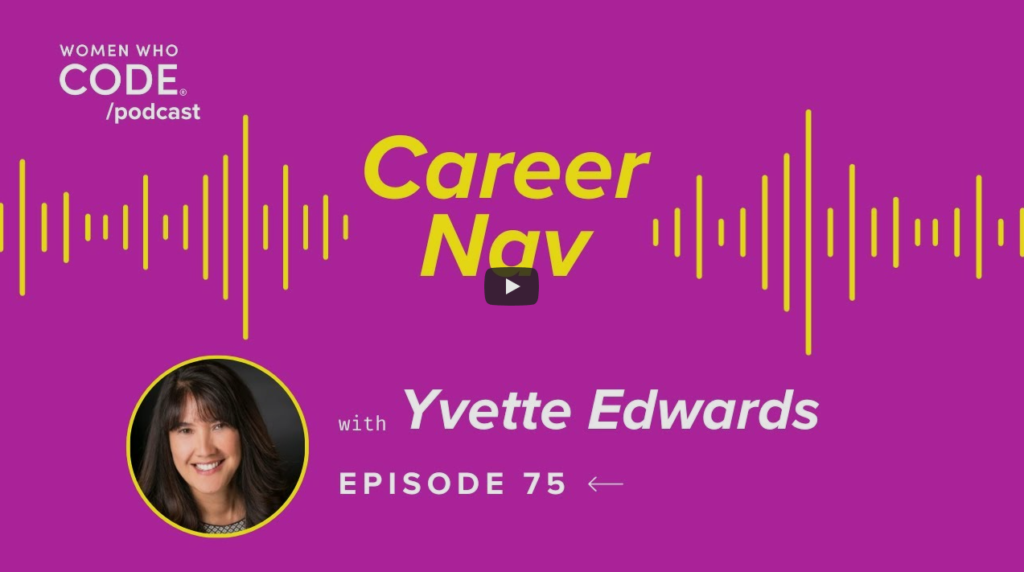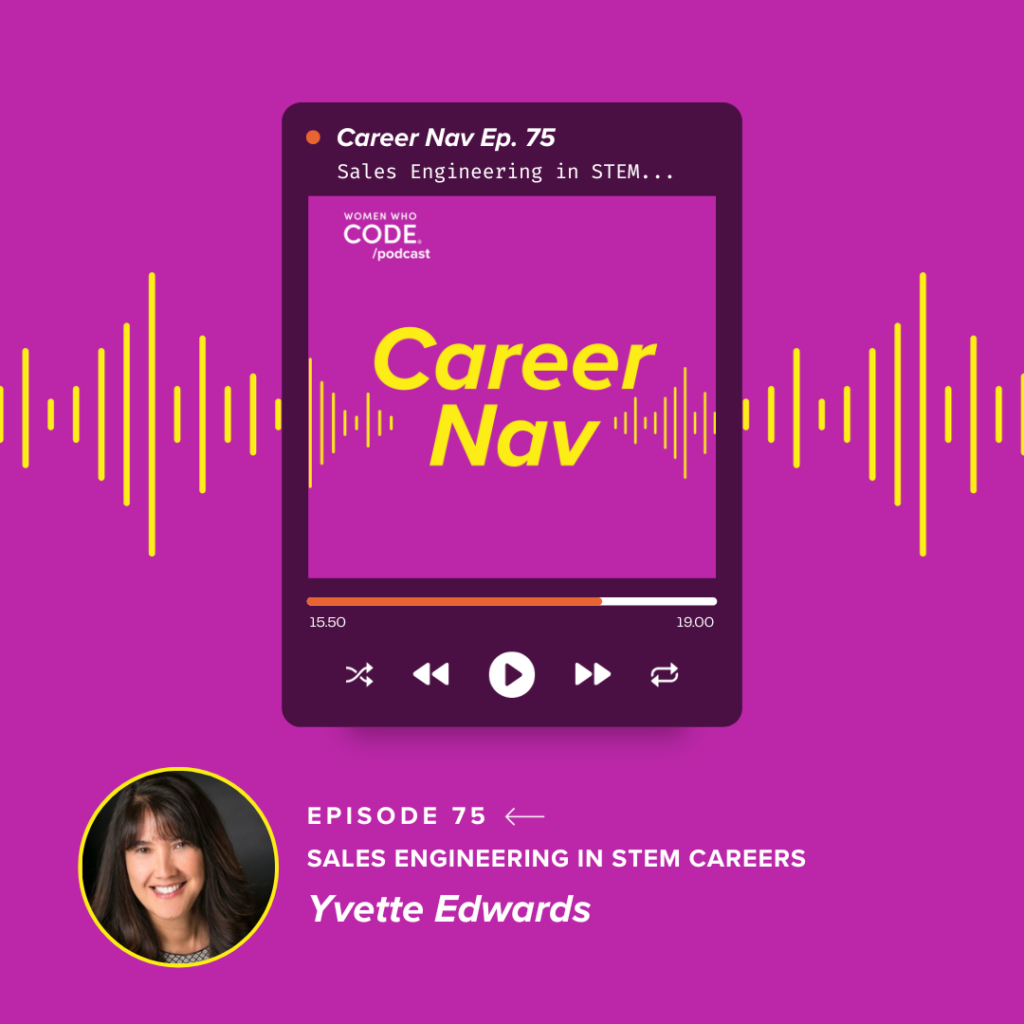Career Nav #75: Sales Engineering in STEM Careers
Written by Yvette Edwards

iTunes – Spotify – Google – Video – More Episodes
Molly Devine, Development Events and Grant Manager with Women Who Code, sits down for a talk with Yvette Edwards, Vice President of Public Sector Solution Engineering at VMware. They discuss Yvette’s passion for her current customer base, resume tips, and the importance of researching a company before an interview.
Share a little bit about how you first got involved in tech.
I went to college and studied computers in school. A week after graduation, I started as a software engineer writing code at AT&T. I thought that would be the rest of my career. I loved coding because I love problem-solving. About five years later, AT&T was going through a transformation, and I noticed we were doing a lot of offshore coding. We still had a lot of work on our team, but there were a lot of new projects that other people were writing code for us.
One of my girlfriends said, “Hey, maybe we should go to a job fair.” I went with her just on a whim. I came across a company called Oracle, and they were hiring sales engineers. It said sales consultant. They wound up recruiting me to be a sales engineer. I’m so passionate about sales engineering because when I talk about it at colleges, I think we all know about different things you can do with a STEM education. There are doctors, engineers, pilots, and all these things. Sales engineering isn’t something you study in college, but it does use many different skills. It marries communication, curiosity, and technology.
What does the role of sales look like in terms of the technology overall?
It’s just that consultative piece. You’re just sitting with a client, and you are trying to understand what it is that is plaguing the business. It’s taking a step back and working with a client to help them solve a problem. We solve problems in all fields. It could be airlines, financials, cyber security, privacy, or ensuring information is available. It fits every single industry, technology, and problem. It’s dynamic.
What should women considering a career in tech know, or what do they need to know about sales engineering?
I think the reason that people get into tech is passion. For me, it was problem-solving. I also have a curiosity and a thirst for knowledge. Sales engineering, just like many careers, is very dynamic, and you constantly have to be learning. If you’re a person who thrives in a dynamic environment, you love building things and problem-solving, and you have a curiosity, those passions could align greatly with this career.
What role does having that technology base have in securing a job in sales engineering? Could someone who’s maybe a sales professional in just that average sales capacity transition into a career in sales engineering?
It’s been done before. We’ve had folks on the sales side come to our side here in sales engineering. If you’re currently working for a software company and you already understand the technology, and you are that type of person who is super curious and has learned more about the technology, then that’s an easy transition. I was a software engineer, still early in my 20s, I’d only been doing it for five years. I think it helped me that I had been working in the field for five years, truly using software and understanding what it’s like to be an end user. I think this career lends itself to a second career. I have worked with the PreSales Collective, where we did a series to educate people on how to learn more about this career. We reached out to math teachers who were looking for a second career. As long as you have a proclivity for some technology, it can go across many industries. I represent the software industry, whether mechanical, manufacturing, or anything else.
What skill sets are good for a career like this?
Empathy is great because you must put yourself in your customer’s shoes. Good listening skills, technical, math, or science, and curiosity. We also look at a growth mindset. Being a fast learner is important, too, because you have to think on your feet. Communication skills are really important, which also means listening.
What do you want on your resume, or at least show that you’re building towards it?
Some architecture or solutions and success stories of how you’ve helped a customer before. If you have interacted with clients or represented your company, it could be something like a Toastmasters class or even HOA, just showing your leadership abilities, presentation skills, and executive presence.
Do you have advice for anyone interested in sales engineering and how they might get started?
There is the National Society of Sales Engineers, which is good. There’s also another company called PreSales Collective. They have webinars all the time. PreSales Collective has some classes you can learn a little more about if you are a career changer. I would suggest looking at the National Society of Sales Engineers if you are in a college. They will help you start a Society of Sales Engineers club at your college.
What drew you to the government and education side of things within tech?
That is my current role, and I love this set of customers. We know they’re out there defending our country, educating our students and our future workers of the world, and making sure that our cities are protected and safe. Not only should you find a company that’s a great match for you, has a good culture, and has a place where you can learn and grow, but you should also consider what industry you want to support.
How could people learn more about these positions, or how can they even find them if they start career searching? What might be some keywords?
This career has a lot of names. I would search for a sales engineer, solution engineer, and sales consultant. There’s also a solution architect. Some folks use that word as well. AI is now smart enough to translate solution engineers into sales engineers.
What should someone be prepared for in the interview process?
If you apply for a technology company, spend time on their website. If they have some end-user conference for us, we call it VMware Explore. It used to be called VMworld. Go out and find old videos and learn about their technology. They will want to know why you’re choosing their company and why you want to sell their technology. Make sure that you’re educated enough about their technology, number one. Number two, do some research on the industry. If you are a customer of that company, that would be a good value. Talk about how you use our technology. Find a way to translate your skills into what a sales engineer would do. Collaboration is huge in this career. You’re working with a sales counterpart. You might be working with other specialists, you’re working with a customer, and all of the different silos that they have. You must ensure you know how to collaborate between teams, which goes back to that communication piece.
Do you have a pro tip that helped you succeed and grow in your career?
I truly believe in a growth mindset. When you’re lucky enough to find a career you’re passionate about, doing well, and getting comfortable, take on a new skill. Say yes if you are asked to take on a new challenge. I have every time, and it’s helped me grow and it’s helped me expand who I am.
***************
Video: https://youtu.be/Vof7vvcPKQY
Guest: Yvette Edwards, Vice President, Public Sector Solution Engineering at VMware
https://www.linkedin.com/in/yvetteedwards1
Host: Molly Devine, Individual Giving Manager, Women Who Code
https://www.linkedin.com/in/molly-devine-mpa-0550a666/
Producer: JL Lewitin, Senior Producer Press and Communications, Women Who Code
